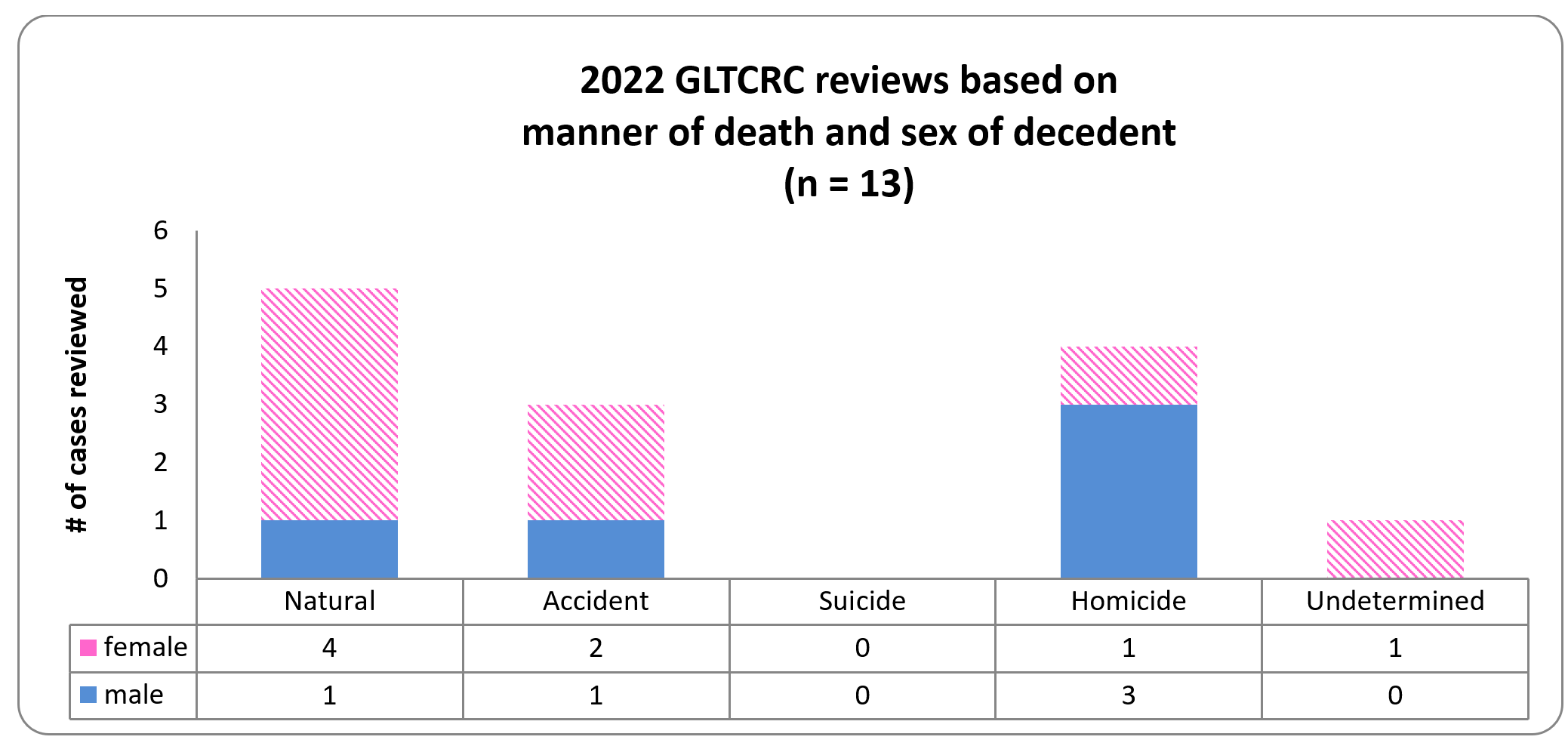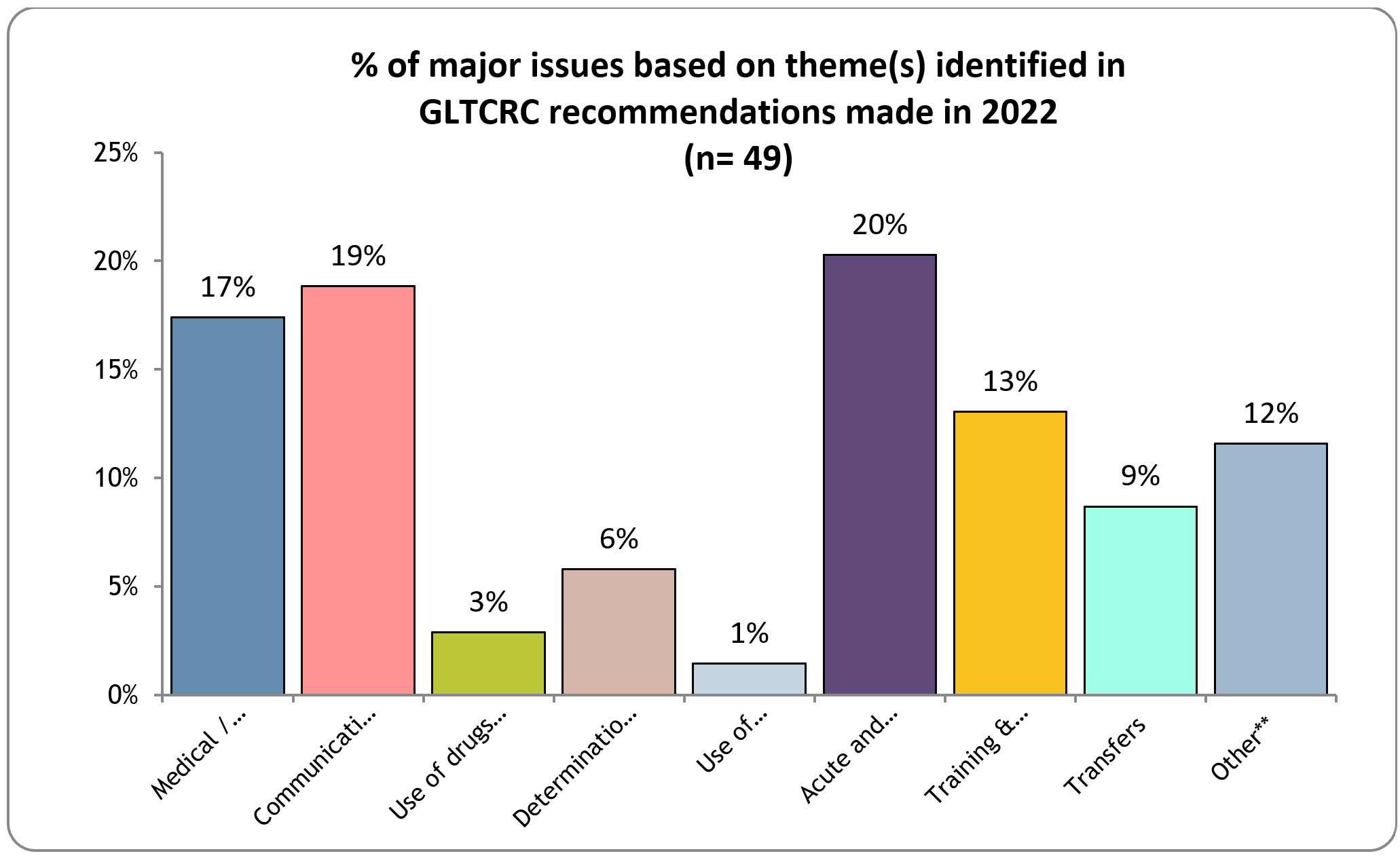Chapter 3: Cases reviewed in 2022
In 2022, the GLTCRC reviewed a total of 13 cases involving the deaths of 13 elderly individuals (seven females and six males), including residents of long-term care and retirement homes. Of the 13 cases, five were mandatory reviews resulting from homicides that occurred in long-term care facilities.
Of the cases reviewed in 2022, one of the deaths occurred in 2016, one in 2018, two in 2019, seven in 2020, and two in 2021.
[Note: The OCC has made it a policy to submit all coroners’ investigations involving homicides in long-term care or retirement homes in the province to the GLTCRC for further review. Other cases involving the deaths of elderly individuals (regardless of whether they are in a long-term care or retirement setting), may be referred to the GLTCRC for review if systemic issues or implications may be present, or if concerns were identified by the family, investigating coroner or Regional Supervising Coroner.]
A summary of cases reviewed, and recommendations made in 2022 is included in Appendix A.
Full, redacted reports and responses to recommendations may be obtained by contacting the OCC at occ.inquiries@ontario.ca.
Average age of decedent in cases reviewed in 2022
- Male: 80.1 years
- Female: 86.6 years
- From the cases reviewed in 2022, the average age of all decedents was 82.6 years.
Graph Three: 2022 GLTCRC reviews based on manner of death and sex of decedent
Graph Three demonstrates the breakdown of cases reviewed by the GLTCRC based on manner of death and sex of the decedent. Of the 13 cases reviewed, five were natural (four females and one male), three were accidents (two females and one male), four homicides (one female and three male), and one undetermined (one female); there were no suicide cases reviewed.
In 2022, the GLTCRC generated a total of 49 recommendations aimed at preventing future deaths. Two cases resulted in no recommendations. Although the GLTCRC may not have generated recommendations in these cases, the analysis of the circumstances and subsequent discussions contributed significantly to the larger coroner’s investigations of these deaths.
Recommendations made by the GLTCRC are distributed to relevant individuals, facilities, ministries, agencies, special interest groups, health care professionals (and their licensing bodies) and coroners. Agencies and organizations in a position to implement recommendations are asked to respond to the OCC within six months. These organizations are encouraged to report on the implementation status of recommendations assigned to them.
Recommendations are also shared with chief coroners and medical examiners in other Canadian jurisdictions and are available to others upon request.
Graph Four: Percent of major issues based on theme(s) identified in GLTCRC recommendations made in 2022
Graph Four demonstrates the distribution of themes/issues for the recommendations made for the cases reviewed in 2022. The most commonly identified themes/issues were related to the acute and long-term care industry (20%), communication and documentation (19%), medical or nursing management (17%), training and education (13%), “other” (12%), transfers (9%), use of drugs in the elderly (3%), determination of consent and capacity (6%), and use of restraints (1%).
Notes: Some recommendations had more than one theme/issue attributed.
'Other' includes recommendations that do not fall into any of the other listed themes. In 2022, these recommendations captured issues relating to research, data collection, or was case specific.
It is recognized that the issues identified and any resulting trends, are based on the cases that are referred for review. Other than the reviews of homicides within LTCHs which are mandatory (based on the policy of the Office of the Chief Coroner), all other cases are referred for review based on a discretionary, and therefor subjective, decision to do so. It is acknowledged that the discretionary nature of some referrals may result in trends based on issues or concerns that have been identified as areas requiring further attention and analysis.
Overall summary of cases reviewed, and recommendations made by the GLTCRC in 2022
- In 2022, there were 13 cases involving 13 deaths reviewed by the GLTCRC. There were 49 recommendations made. Of the 13 cases reviewed, two resulted in no recommendations.
- Of the 13 cases reviewed in 2022, the breakdown for manners of death were:
- Natural - 5 (one male and four females)
- Accident - 3 (one male and two females)
- Homicide
footnote 1 - 4 (three males and one female) - Undetermined – 1 (one female)
- Medical/nursing management issues were identified in 17% of the recommendations made.
- Communication and documentation issues were identified in 19% of the recommendations made.
- MOH and MLTC and/or LTC industry issues were identified in 20% of the recommendations made.
- ‘Other’ (captured recommendations relating to research, data collection, or was case specific) was identified in 12% of the recommendations made.
- Use of drugs in the elderly was identified in 3% of the recommendations made.
- Training and education issues were identified in 13% of the recommendations made.
- The use of restraints in the elderly was identified in 1% of the recommendations, 9% of transfers (patient and information), and determination of consent and capacity / DNR in 6% of the recommendations.
- Some of the recommendations touched on more than one issue.
- One case did not have any recommendations.
- Of the 13 cases (involving 13 deaths) reviewed, 8 involved female deceased persons and 5 male deceased persons.
- The average age of all decedents (that is, male and female combined) in cases reviewed in 2022 was 82.6 years.
- Of the cases reviewed in 2022, the manner of death for each of the 13 deceased persons was: natural (5), homicide (4), accident (3), and undetermined (1). There were no cases of suicide reviewed in 2022.
Footnotes
- footnote[1] Back to paragraph For the purposes of a coroner’s investigation, the finding of “homicide” does not imply a finding of legal responsibility or culpability.

